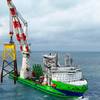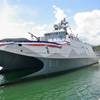Telling an audience of education and training specialists from industry, academia and the government that they have an awesome responsibility, Rear Adm. Gary Jones, Commander Naval Education and Training Command (NETC), addressed the Learning Strategies Consortium Conference in Orlando, Fla., July 18.
Coordinated by the Navy’s Human Performance Center, the conference was themed "Real Issues, Real Solutions for Global Learning," and focused on global learning as it pertains to learning without boundaries.
“We have an awesome responsibility,” explained Jones. “When great men and women step forward to lead our nation -- whether in politics, business or the military -- their training and education (or development) is the underpinning of their success. We are in a crucial time in history, and how we develop our leaders is not only essential to their success, but also the success of our nation and, for the military, to the preservation of our freedom.”
Commenting about the Navy’s efforts in the war against violent extremists, Jones said the U.S. Navy’s ability to deliver two unique attributes -- global reach and persistent presence -- continues to support the United States’ worldwide responsibilities and provide a powerful deterrent force in day-to-day operations around the globe.
According to Jones, NETC is executing innovative professional and personal development and learning initiatives to sustain the Navy’s combat readiness.
“This is a vital part of developing 21st century leaders needed to meet the rapidly expanding requirement posed by the nation’s evolving maritime strategy,” said Jones.
One of the initiatives includes new training for a growing number of Navy Tactical Human Intelligence personnel to support the Naval Expeditionary Command and Naval Special Warfare community. This training includes new and expanded courses in counter intelligence and expeditionary Naval ground intelligence at the Navy Marine Corps Intelligence Training Center (NMITC).
In other training to support the thousands of Sailors and Marines deploying throughout the world, the Center for Information Dominance (CID) established the Center for Language, Regional Expertise and Culture (CLREC) to identify training solutions for Navywide operational requirements in foreign culture and language skills.
“The Center for Security Forces (CSF) developed new programs to respond to the changing needs of the fleet and joint forces against this mobile and determined enemy,” said Jones. “The Non-Compliant Boarding-Visit, Board, Search, & Seizure Course trains teams which are used to board suspicious vessels that may be trafficking drugs or harboring terrorists.”
Jones also talked about the Navy’s support of America’s allies. Through the Naval Education and Training Security Assistance Field Activity (NETSAFA), 3,254 foreign military students of allied nations graduated from Navy courses last year ranging from enlisted skills training to officer flight training.
Calling them America's newest "Greatest Generation," Jones said the young men and women who volunteer to wear a uniform or to "wear the cloth of our nation," have some very strong beliefs about their country.
“They have chosen a lifestyle of service, dedicating themselves to the highest standard of American citizenship and commitment,” Jones said. This generation gets it. They know that it’s their turn. They are proud of what they are doing and they well know their place in history.
“The U.S. military is a formidable force. While our weapons and fight platforms are excellent, the men and women who serve are truly the most important weapon in our arsenal.”
By Joy Samsel, Navy Education and Training Command Public Affairs
Featured videos

Commercial Maritime’s Sail Solution, with French Flair

Power Play

U.S. Dredging’s Bull Run Should Continue Under Trump Administration
Subscribe for
Maritime Reporter E-News
Maritime Reporter E-News is the maritime industry's largest circulation and most authoritative ENews Service, delivered to your Email five times per week










